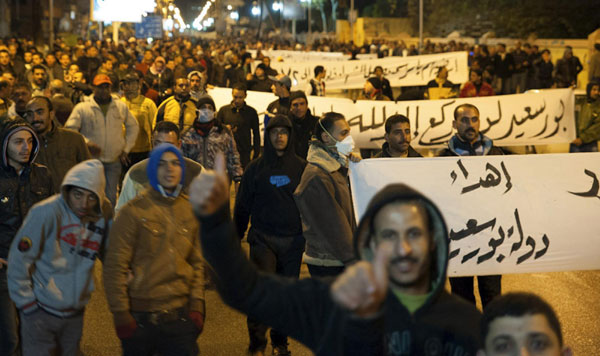Egyptian protesters defy curfew
Updated: 2013-01-29 10:06
(Agencies)
|
|||||||||||
 |
|
Protesters, who are against Egyptian President Mohamed Morsi, march during a nighttime curfew in the city of Port Said January 28, 2013. Photo/Agencies] |
CAIRO/ISMAILIA, Egypt - Egyptian protesters defied a nighttime curfew in restive towns along the Suez Canal, attacking police stations and ignoring emergency rule imposed by Islamist President Mohamed Morsi to end days of clashes that have killed at least 52 people.
At least two men died in overnight fighting in the canal city of Port Said in the latest outbreak of violence unleashed last week on the eve of the anniversary of the 2011 revolt that brought down autocrat Hosni Mubarak.
Political opponents spurned a call by Morsi for talks on Monday to try to end the violence.
Instead, huge crowds of protesters took to the streets in Cairo, Alexandria and in the three Suez Canal cities - Port Said, Ismailia and Suez - where Morsi imposed emergency rule and a curfew on Sunday.
"Down, down with Mohamed Morsi! Down, down with the state of emergency!" crowds shouted in Ismailia. In Cairo, flames lit up the night sky as protesters set police vehicles ablaze.
In Port Said, men attacked police stations after dark. A security source said some police and troops were injured. A medical source said two men were killed and 12 injured in the clashes, including 10 with gunshot wounds.
"The people want to bring down the regime," crowds chanted in Alexandria. "Leave means go, and don't say no!"
The demonstrators accuse Mubarak's successor Morsi of betraying the two-year-old revolution. Morsi and his supporters accuse the protesters of seeking to overthrow Egypt's first ever democratically elected leader through undemocratic means.
Since Mubarak was toppled, Islamists have won two referendums, two parliamentary elections and a presidential vote. But that legitimacy has been challenged by an opposition that accuses Morsi of imposing a new form of authoritarianism, and punctuated by repeated waves of unrest that have prevented a return to stability in the most populous Arab state.
Related Stories
Egypt's Morsi orders curfew, state of emergency 2013-01-28 05:01
30 killed in Egypt riots after 21 sentenced to death 2013-01-27 14:46
21 gets death penalty for Egypt soccer violence 2013-01-26 17:30
Egypt releases protesters on presidential pardon 2013-01-20 08:24
Death toll of Egypt's building collapse rises to 24 2013-01-17 03:00
Today's Top News
President Xi confident in recovery from quake
H7N9 update: 104 cases, 21 deaths
Telecom workers restore links
Coal mine blast kills 18 in Jilin
Intl scholarship puts China on the map
More bird flu patients discharged
Gold loses sheen, but still a safe bet
US 'turns blind eye to human rights'
Hot Topics
Lunar probe , China growth forecasts, Emission rules get tougher, China seen through 'colored lens', International board,
Editor's Picks

|

|

|

|

|

|





